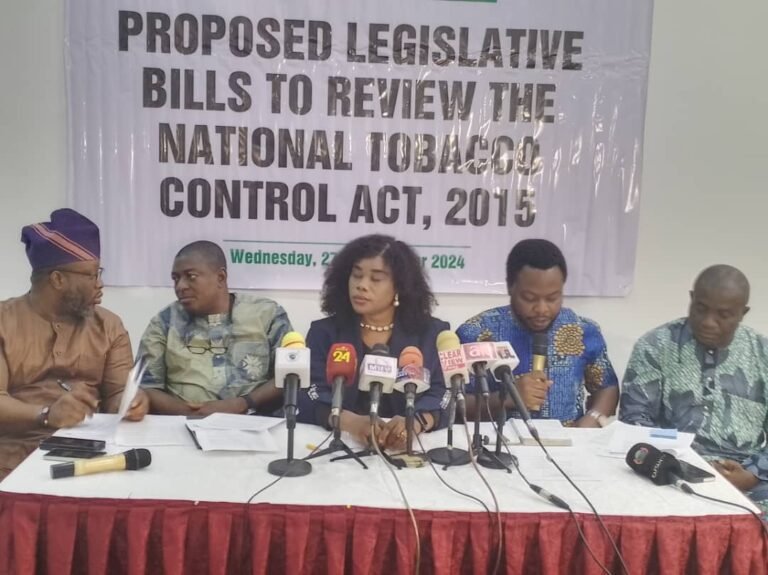Corporate Accountability and Public Participation Africa (CAPPA) has expressed concern about the increasing and inappropriate interactions between government actors and the tobacco industry.
It added that despite the clear provisions of Section 18 of the National Tobacco Control Act 2015, which prohibits the tobacco industry from influencing public health policies, forming partnerships with public institutions, or engaging in youth initiatives disguised as Corporate Social Responsibility (CSR) activities, the reverse is happening.
The Executive Director of CAPPA, Oluwafemi Akinbode, while addressing a press conference on Wednesday in Abuja, said the tobacco industry continues to partner with state governments openly, the National Youth Service Corps (NYSC), universities and even key government functionaries, using these engagements to whitewash its image and undermine public health efforts.
His words: “We urge the Nigerian government and public health authorities to rigorously enforce Section 18 of the National Tobacco Control Act, ensuring that all interactions with the tobacco industry are transparent and strictly regulatory.
“By addressing these violations and adopting amendments that genuinely prioritise public health, Nigeria can align its tobacco control framework with global best practices, protect its citizens, and hold the tobacco industry accountable.”
Akinbode also called for imposition of stiffer penalties for violations of smoking regulations in order to safeguard the well-being of all Nigerians.
While acknowledging recent efforts to review the National Tobacco Control Act, 2015, he maintained that any such review must uphold the protection of public health, strengthen regulatory oversight, and decisively close the loopholes that allow the tobacco industry to continue exploiting vulnerable populations in Nigeria.
He recalled that a public hearing was held last week at the House of Representatives to discuss two proposed Bills aimed at amending the National Tobacco Control Act (NTCA) 2015, titled House Bill (HB) 47 and HB 1151.
The Executive Director stressed that while these Bills represent an opportunity to strengthen tobacco control in Nigeria, they also revealed gaps that must be addressed to ensure that their proposed amendments align with what ought to be the ultimate goal, which is safeguarding the well-being of all Nigerians over the profit-driven interests of the tobacco industry.
Also, Senor Programme Manager, Policy and Research, ZIkora Ibeh explained that HB 1151, which seeks to impose stiffer penalties for violations of smoking regulations, suffers from a fundamental flaw in misrepresenting the title of the Principal Act and the referenced Sections for amendments.
She stated: “By attempting to amend a “National Tobacco Smoking (Control) Act 2015-a law that does not exist it raises concerns about the legislative intent and procedural soundness. We have strongly recommended that this Bill be withdrawn.
“Regarding HB 47, which aims to cure certain defects in the NTCA 2015, ensure its effective implementation, as well as address the lacuna that may be exploited by the tobacco industry in Nigeria, we have commended its intent but highlighted some gaps and areas that require strengthening.”
Ibeh pointed out that there was a need to strengthen the Law and Regulation to cover new and emerging tobacco products such as vapes, e-cigarettes, nicotine pouches, heat-not-burn devices, and smokeless tobacco remain largely unregulated under the NTCA 2015.
She stressed that these products, which have rapidly gained traction, are aggressively marketed to youth and often falsely advertised as “safer alternatives.”
According to her, We strongly recommend that HB 47’s proposed amendment in Section 12, which addresses tobacco advertising, promotion, and sponsorship bans, or any future amendment Bill, explicitly name and include new and emerging products under such restrictions to effectively close this regulatory loophole.
Ibeh emphasised that the proposed 30-meter restriction in Section 9 of HB 47, which addresses no-smoking zones around schools, daycare centres, and parks, was insufficient to protect vulnerable populations, particularly children.
She was of the opinion that this proposal falls short of the 2018 Senate resolution, which mandates a 100-meter buffer around schools.
“To harmonise with existing national standards, we recommend expanding the restriction to at least 100 meters. This measure will ensure greater protection from secondhand smoke exposure and prevent the industry from exploiting differences in distance regulations,” Ibeh added.

